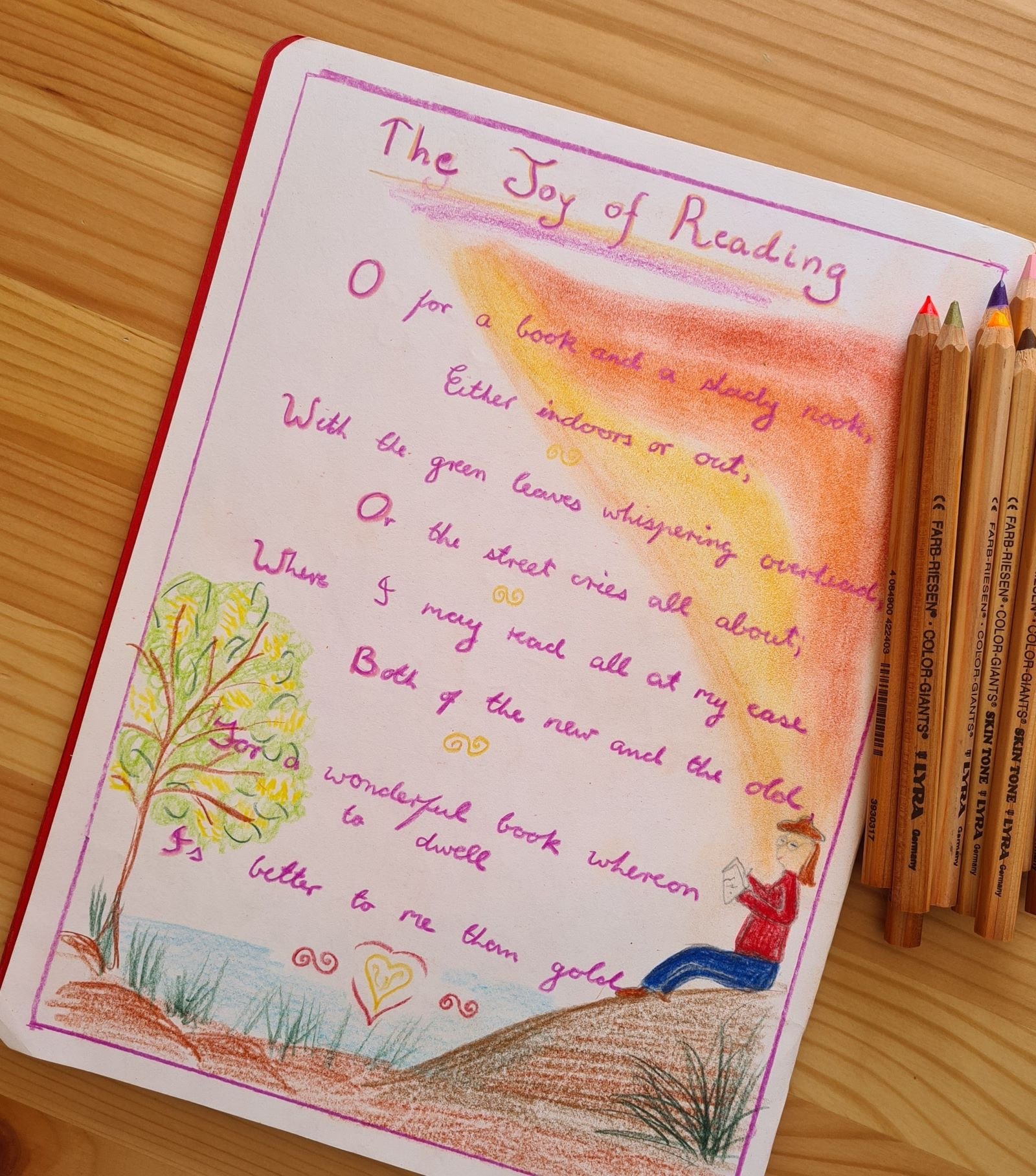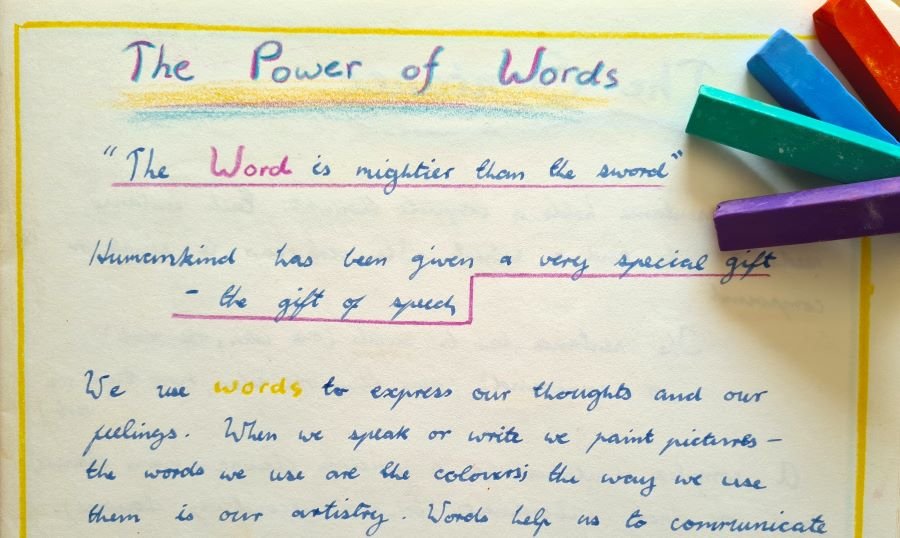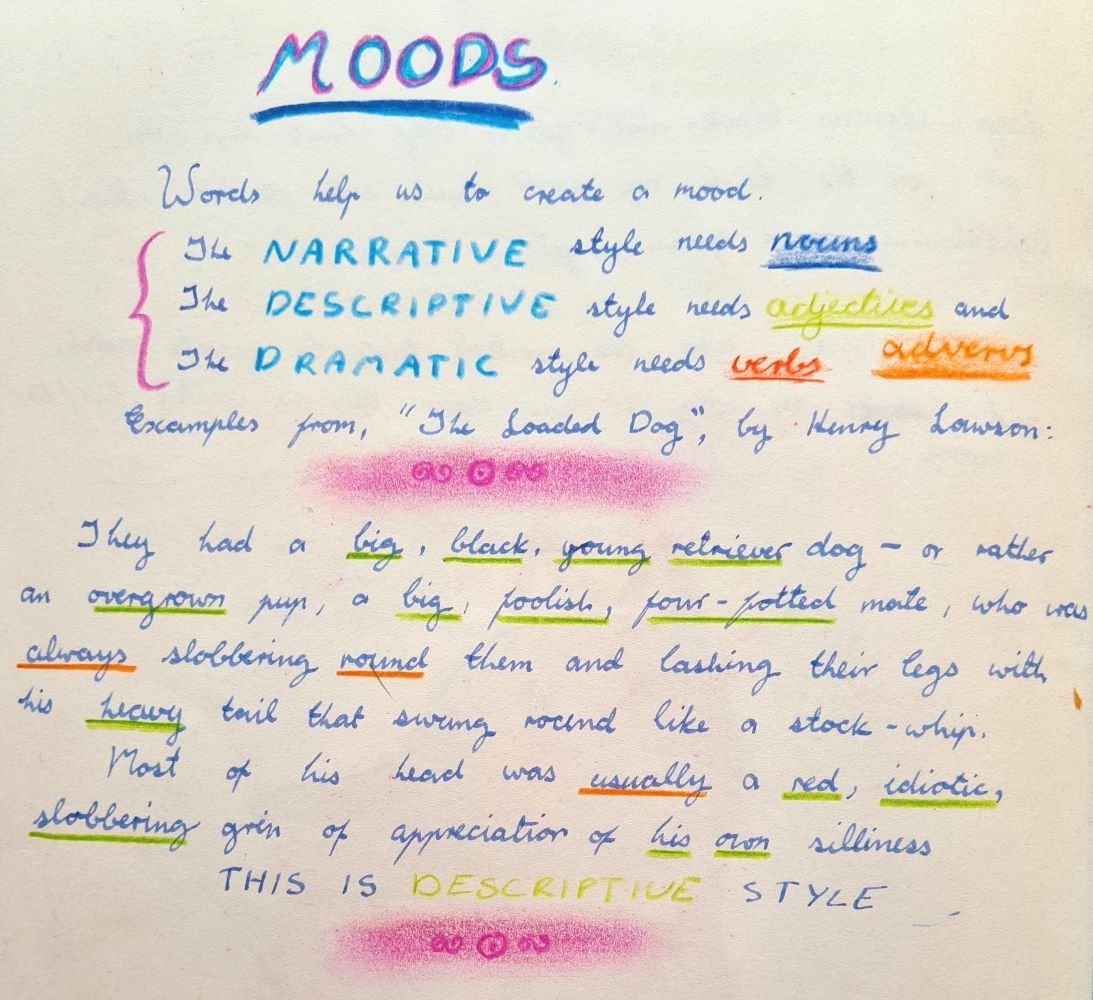English
English for Adolescent Children
English is not offered as a standalone subject. English is integrated with Main Lesson.

“A strong feeling for the inner mobility of language, must become part of the children’s sense of language.”
~Rudolf Steiner
Self Expression
Students learn the beauty and power of language through exploration of their individual inner landscape.
Competencies Explored
Literacy skills that may be explored include essay writing, more challenging spelling, writing descriptive and expressive poetry and prose, enlivening sentences with adjectival and adverbial clauses, metaphor, simile alliteration, writing factual reports, summaries and book reviews.
English Development for the Adolescent Child in Steiner Education
As the child awakens toward pubescence, they are experiencing a dynamic inner tension between a strong desire to explore their own voice and style, and an inner search for calm objectivity. This tension gives rise to fluctuating and sometimes strong soul moods. Helping raise these feelings to consciousness, guiding them to learn the language of their own soul moods and how to express this inner landscape, whilst maintaining an objective center, these are the tasks of the language curriculum for the adolescent child.
“It is at this stage that young people lose their intuitive connection to the spirit of language and must regain this through conscious work.”
~The Educational Tasks and Content of the Steiner Waldorf Curriculum edited by Martyn Rawson and Tobias Richter
Blossoming through Language
The young person now wants to consciously use the power of language to individualise what they want to say, or alternately they may use language to hide behind, to mask newly-awakened and raw inner feelings. A sound language curriculum at this age will inspire previously reticent or unrecognised feelings to bloom in written expression, whilst simultaneously, as a balance, objectivity is practised in the writing of factual reports, short summaries and book reviews.
“One must try to develop in the child, in sentence building, a truly plastic capacity for giving expression to wish, wonder and surprise. The child should form sentences which really do bear an inner relationship to the form of the feeling itself.”
~ Rudolf Steiner
Exploration of Self
Steiner indicates that a “good strong diet is needed” of poetry and prose that evoke powerful feelings. Ballads in particular satisfy the need for dramatic effect. The full palette of moods can be explored in linguistic expression.
Through metaphor, simile and descriptive imagery the child learns to recognise and express the polarities within their own soul, feelings such as repulsion-attraction, desire-satisfaction, distress-comfort, wonder-indifference, fear-calmness, confidence-doubt.
In essay writing, the children are given topics that set different perspectives against one another, calling for the inner discipline of objectivity. For example, one essay topic is ‘The personal computer, a witness to human strength’, followed by the next essay topic ‘The personal computer, a witness to human weakness.’
Fire
Flamboyant and fierce
Crackling and crunching
Whipping and whirling
Is the flicking of fire.
Exploring Language
The young person of this age group needs to develop a sense for the beauty and the power of language.
They are encouraged to read widely both fiction and non-fiction, and of many different genre and styles of expression, and to find beauty and strength in individual words and phrases.
The performance of dramatic plays is congruous to the soul life of the pre-pubescent and pubescent young person.
“Transformed orality is also cultivated whenever the imagination is engaged consciously and given form and structure. The livelier the interplay of linguistic exchange, the more spacious the ‘field’ in which language can grow, inviting the individual to move about in it.”
~The Educational Tasks and Content of the Steiner Waldorf Curriculum edited by Martyn Rawson and Tobias Richter.
English Competencies Explored
Literacy skills covered include: essay writing, more challenging spelling, writing descriptive and expressive poetry and prose, enlivening sentences with adjectival and adverbial clauses, metaphor, simile alliteration, writing factual reports, summaries and book reviews.
Read more about Steiner Education.
Student Work Examples
Meet Our English Skills Tutor
-
From a young age I had a strong calling to be a teacher.
In 1981 I completed my Diploma of Education at Newcastle College of Advanced Education. My early teaching experiences were in NSW state primary schools in the Hunter Valley, from tiny one-teacher country schools to large city schools.
Having found anthroposophy before graduating, I longed to teach in a Steiner school. I found my first appointment at Linuwel Steiner School in East Maitland where I was immersed in, and impressed by, the beauty and wisdom of this comprehensive educational approach. Thereafter I taught many combined grades at Armidale Waldorf School on the NSW tablelands throughout its pioneering phase, and later at Orana Steiner school in Canberra where I began as a relief teacher for classes 1-7 and then, as a class teacher, I completed a seven-year class cycle.
Besides learning and working and creating with children, I also love gardening, bushwalking, recreational cycling, reading and deliberative democracy.
I am a member of the Australian Tutoring Association (ATA), and hold a current WWVP registration.
Testimonials
-
Petra Cram is a dedicated teacher by vocation with an eye for the whole person in each child. She combines a love and knowledge of the subject at hand with teaching expertise gained over decades.
My son was in Petra's class during his formative years and is now studying law and science, he is fluent in Japanese and plays the violin, with a strong love of learning and outgoing interest in the world.
I am glad for the wonderful things in his life that were once small seeds, planted and watered by Petra all those years ago.
Caroline Archer
October 2022
-
Petra Cram was our son’s class teacher for seven years. She displayed love and care for the class as a whole and each individual in it. Petra dealt with the wide-ranging and evolving demands of her role in an exemplary manner, not only with regard to the teaching content, but also with regard to how it was delivered - always kind, meticulous and super-conscientious.
Michael Stenning is Co-Director of 'Freedom in Action'.
Michael Stenning
October 2022
-
Petra Cram taught my eldest daughter Dana in her first years of school. She was an extraordinary teacher and a fantastic introduction to the Steiner approach. In preparing this testimonial, I asked Dana (now 20 years old) what she remembered most about Petra. She replied that Petra was always calm and extremely caring, almost like a second mother. She helped Dana to solve problems and she knew when to set boundaries. We could see that Petra had the gift of being able to interest students in learning through an artful combination of stories and activities. She is also highly skilled at noticing when some students are capable, and then enlisting them to help other students, thereby extending everyone.
Since that time, I have occasionally worked with Petra in a more professional capacity through our shared interest in participatory democracy. I have found Petra to be extremely diligent, capable and well organised. I greatly admire her passionate commitment to helping others combined with her tremendous capacity to understand and implement participatory processes.
I would have no hesitation in recommending Petra as an extraordinary tutor.
Dr Paul Atkins is a Co-Founder and Vice President of Prosocial World. You may like to read Dr Atkins co-authored book Prosocial.
Dr Paul Atkins
September 22
-
We first met Petra Cram 23 years ago when she started a 7-year-teaching cycle of teaching at the Orana Steiner School in Canberra. Our eldest son began in class one and remained until completing class seven with Petra.
Petra opened our very first Parent-Teacher meeting with the words: "Thank you for entrusting your child to me". Petra’s attitude was one of deep responsibility.
From the beginning we always were, as a family, in the best of hands with Petra.
Petra was able to deeply nurture our son and he blossomed in her care emotionally and intellectually. We are so grateful to Petra that we could always trust her and for her exceptional care for our son.
Bettina and Tim Ivers
August 2022









